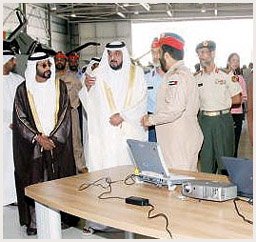dazzling, i want to make sure that i am following what you are saying. is shiekh khalifa mainly a figure head with sheikh mohammed or someone else running the show?
Maybe I can try to answer that one...it might take some time to read I´m afraid.
Right up to the announcement of Zayed's death, even those locals and veteran expatriates who considered themselves among the best informed had got it all wrong. Indeed, with the exception of just one publication, almost all had predicted the succession of Zayed's astute, dynamic and highly visible third-eldest son, Muhammad. Only one year previously, Muhammad had been appointed by his father to the all-new position of deputy crown prince, a move interpreted by some as deliberately smoothing the way for the succession. However, in accordance with primogeniture, the eldest of Zayed's sons and Abu Dhabi's crown prince since 1966, Khalifa, was quietly proclaimed the new ruler.
Khalifa got no full brothers. A bloc of six of Zayed's other sons are, however, full brothers, and most significantly their mother, Shaikha Fatima bint Mubarak al-Qitbi, was Zayed's favored wife and continues to be regarded as the UAE's "First Lady." Predictably, as something approaching a cohesive political bloc in an otherwise highly fragmented dynasty, they have collectively grown in power as they have grown older.
Partly due to their Western education, they are thought to have much in common with emerging technocratic elements in the Council of Ministers and the Federal National Council. Crucially, they have between them gained important control over foreign affairs and parts of the military, domestic intelligence, information services, and other institutions closely connected to national security.
The eldest of these Bani Fatima is the crown prince Muhammad.
To contain the power of the Bani Fatima President Sheikh Khalifa got support from a more splintered fraction that often are referred to as the Bani Muhammad bin Khalifa, they where the main powerbrokers during the late Emirs reign and with him basically built the UAE from scratch.
Indeed, of the late Khalifa's six grandsons, all assumed important positions of power during the early years of Zayed's administration. The eldest of these, Hamdan, was one of the most vociferous supporters of Zayed's cause in 1966 and was at one point even considered as a potential crown prince should anything happen to Zayed's sons. He was the first chairman of Abu Dhabi's new Public Works Department and then became the UAE's deputy prime minister for much of the 1970s and the early 1980s. The second eldest grandson, Mubarak, served as Abu Dhabi's chief of police during the critical first few years of Zayed's rule and was later rewarded with control over the Ministry of the Interior. Tahnun, the third of the Bani Muhammad bin Khalifa, has for some years been a member of the Supreme Petroleum Council and a former director of the Abu Dhabi National oil Company (ADNOC), in addition to holding the deputy chairmanship of the Abu Dhabi Executive Council (Abu Dhabi's emirate-level cabinet). Perhaps most significantly, Tahnun remains the governor of Abu Dhabi's eastern region, which includes the enormous responsibility of governing the emirate's second largest city, Al-Ayn.
Notable among the other grandsons have been Saif, who was chairman of the Abu Dhabi Planning Department and the UAE's minister of health for much of the 1970s, and Surur who was the original chairman of Abu Dhabi's Department of Justice, the chamberlain of the Presidential Court for a long period, the chairman of the Abu Dhabi Department of Water and Electricity, and at one point also the chairman of the UAE Central Bank.
Today, many of these grandsons remain influential, and many of their own sons have formed the latest generation of the loyal Bani Muhammad bin Khalifa. In particular, Hamdan's son Khalifa is the chairman of Abu Dhabi's Department of Economy, while his other sons include Hamad, a successful businessman with the nickname "The Rainbow Shaikh' given his fleet of multicolored cars, and Sultan, chairman of Protocol and the Presidential Guest House. Mubarak's eldest surviving son, Nuhayyan, is minister of education and the president of Zayed University, with his other son, Hamdan, serving as the chairman of Abu Dhabi's Civil Aviation Department (and at one point being the chairman of Gulf Air). Similarly prominent are Tahnun's sons, who between them hold positions on the Abu Dhabi Executive Council, the chairmanship of the powerful General Industry Corporation (essentially a government parastatal),
Despite their ongoing influence however, they and their sons are nowhere nearly as powerful as they were in Zayed's early years. For example, Hamdan bin Muhammad's position of deputy prime minister has been lost to Hamdan bin Zayed, while Surur bin Muhammad's chairmanship of the UAE Central Bank has also been lost (remarkable, given that many believed Surur could have become Khalifa's new crown prince following Zayed's death77). Similarly the Bani Muhammad bin Khalifa have lost the directorship of ADNOC, the chamberlainship of the Presidential Court, and indeed almost all of the ministerial portfolios that they held during the 1970s and 1980s. Clearly, they have been squeezed, mainly by the rising Bani Fatima, and, although there has been some intermarriage between the two blocs, they remain a completely distinct faction. Crucially, of Zayed's sons, they have always been closer to Khalifa, as he is, of course, not a part of the Bani Fatima and therefore regarded as the best potential balancing force. In addition, Khalifa's mother, Shaikha Hussa, was a sister of the Bani Muhammad bin Khalifa, and most of Khalifa's daughters have been married into this branch, further reinforcing any future Khalifa-Bani Muhammad bin Khalifa link.
So as you can imagine HH Sheik Khalifa is by no means a figurehead, it´s just that there are two main blocks of power so his powers are limited in certain areas.









